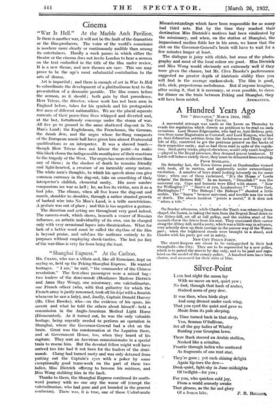Cinema
"War Is Hell." At the Marble Arch Pavilion.
Ir there is another war, it will not be the fault of the dramatists or the film-producers. The voice of the world's conscience is nowhere more clearly or continuously audible than among its entertainers. Hardly a week passes in which either the theatre or the cinema does not invite London to hear a sermon on the text embodied in the title of the film under review, It is a new theme, and new themes are rare. This one may prove to be the age's most substantial contribution to the tuts of drama.
Art is impartial ; and there is enough of art in War Is Hell to subordinate the development of a platitudinous text to the presentation of a dramatic parable. The film comes before the sermon, as it should ; both gain by that precedence. Herr Trivas, .the director, whose work has not been seen in England before, takes for his symbols and his protagonists five men of different nationalities. We see the placid separate currents of their peace-time lives whipped and diverted and, at the last, fortuitously converge under the storm of war. All five go to ground in the same shattered dug-out in No Man's Land; the Englislunan, the Frenchman, the German, the dumb Jew, and the negro whose far-flung conquests of the European music hall have given him almost Pentecostal qualifications as an interpreter. It was a shrewd touch— though Herr Trivas does not labour the point—to make this black clown the indispensable mouthpiece of their reactions to the tragedy of the West. The negro has more resilience than any of them ; in the shadow of death he remains friendly and light-hearted, a creature of an incurably sunny nature. The white men's thoughts, to which his speech alone can give common currency in the dug-out, take on something of their interpreter's childish, elemental sanity. His more sombre companions see war as hell ; he, no less its victim, sees it as a bad joke. The climax, when all five leave the dug-out and march, shoulder to shoulder, through a rather stunted growth of barbed wire into No Man's Land, is a trifle meretricious. A gesture was out of place ; and this is too negative a gesture. . The direction and acting are throughout very good indeed. The camera-work, which shows, beneath a veneer of Russian influence, an artistic individuality of its own, can be charged only with very occasional lapses into theatricalism. What for lack of a better word must be called the rhythm of the film is beyond praise, and subdues the audience entirely to its purposes without employing shock-tactics. The last (so far) of the war-films is very far from being the least.


































 Previous page
Previous page